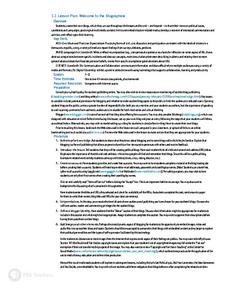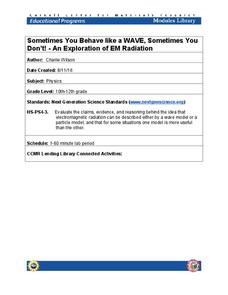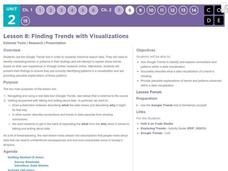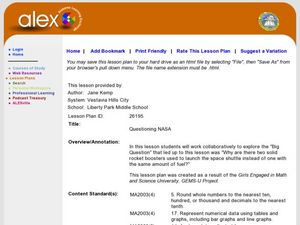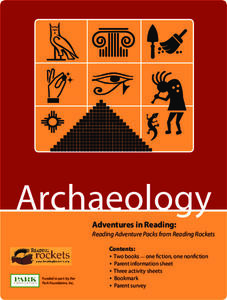Curated OER
Gorilla Alphabet and Number Cards
In this gorilla alphabet and number cards worksheet, students color and cut apart a separate card for each upper and lower case (Zaner-Bloser) alphabet letter. Students also color the number cards from 1 to 10.
Curated OER
Collect the Eggs Game
In this Eggs Game worksheet, learners cut out and put together the game board, tokens, cards and game spinner. Students try to collect the most eggs cards while playing the game.
Curated OER
How Psychologists Do Research
Students discover how psychologists complete their research on different topics. In groups, they describe the elements of an experiment and the importance of sampling during research. They identify ethical issues in their research and...
Curated OER
Green Space in the City
High schoolers identify the different kinds and uses of green space that exist in an urban area. They create maps of local parks and research the history of each park. They conduct a survey of residents near the park and interview a park...
Curated OER
Youth in the Economy
Young scholars discuss and identify their roles within the economy. In groups, they identify the similiarities and differences among different groups of people and describe the types of roles within an economy. They have a partner...
Curated OER
Finding Out-- Forest Researchers
In this social studies and science worksheet, students study facts about the forest, creatures who inhabit the forest and those who work in forestry. Students complete 20 questions including word meanings, surveying classmates, matching...
EduGAINs
Introduction to Solving Linear Systems
Word problems offer class members an opportunity to learn the concept of solving linear systems using graphs. Individuals choose a problem based upon preferences, break into groups to discuss solution methods and whether there is...
Curated OER
Welcome to the Blogosphere
Create a blog spot for your classroom and promote online discussions. There are several blogging websites listed here, and you can create one specific to each class or one collective site. Teach your learners how to post on the blog, and...
Curated OER
Monster Plants Storia Teaching Guide
Who wouldn't want to read a book about monster plants? Get those kids into informational texts with an engaging topic, like meat eating plants! You'll use the teaching guide to provide structured practice as your class reads to...
Curated OER
Review with Creative Writing
Connect a wide range of literature concepts where writers demonstrate mastery through creative writing.
Cornell University
Sometimes You Behave Like a WAVE, Sometimes You Don't!
Electromagnetic radiation behaves like both a wave and a particle. Help classes explore this concept through a lab investigation. Young scientists create optical interference patterns on a glass slide using a carbon layer. They analyze...
Curated OER
Information Overload: Looking at News
How do events reported in mainstream newspapers, on television news, blog posts, and social network sites differ? Ask your class to investigate the way the same news item is presented in the many information sources available. Groups...
Code.org
Finding Trends with Visualizations
Pupils often hear about trends, but they don't always see them. The eighth lesson in a unit of 15 requires individuals to use the Google Trends tool. Class members identify patterns in the visualization before presenting the patterns...
Berkeley Lab
Virtual Frog Dissection Kit
Fluffy is one of the most common names for a pet frog. Fluffy, the digitized frog in this dissection kit, opens up quite literally to allow scholars to see what's inside. The basic kit encourages pupils to click on various organs to see...
PBS
Reading Adventure Pack: Birds
A Reading Adventure Pack takes a close look at birds. After reading a fiction and nonfiction book, scholars craft a thaumatrope, begin a birding journal using their sense of sight and hearing, and build a model bird using supplies from...
PBS
Reading Adventure Pack: Heroes
Three creative activities follow reading a fiction and nonfiction book about heroes. Scholars build hero action figures out of clay for make-believe play, explain in written form how they show bravery, kindness, patience, thoughtfulness,...
PBS
Reading Adventure Pack: Rocks
A Reading Adventure Pack focuses on rocks. Scholars participate in three activities after reading a fiction and nonfiction text—The Jade Stone, a Chinese folktale adapted by Caryn Yacowitz, and Rocks in His Head by Carol Otis Hurst....
Curated OER
M & M Madness
M&M's are always a great manipulative to use when teaching math. In this graphing lesson plan, learners predict how many of each color of M & M's there are. They count up each color and plug the data into a graph using the...
Curated OER
Questioning NASA
Space science and math collide in this inquiry that investigates launching times for antacid-tablet rockets! Upper elementary or middle school learners collect data as they launch these mini rockets. They apply concepts of place value...
Curated OER
Who is the Expert? Exploring Credible Sources in Healthcare
How do you decide what sources are credible when researching online? Evaluate sources with a focus on researching health issues. After brainstorming common health concerns and how they would try to diagnose these problems, class members...
Federal Reserve Bank
Credit Cards - A Package Deal
Arm your learners with the information they will need to make smart decisions regarding credit cards and personal savings.
EngageNY
Summarizing Bivariate Categorical Data
How do you summarize data that cannot be averaged? Using an exploratory method, learners complete a two-way frequency table on super powers. The subject matter builds upon 8th grade knowledge of two-way tables.
Curated OER
Using Random Sampling to Draw Inferences
Emerging statisticians develop the ability to make inferences from sample data while also working on proportional relationships in general. Here, young learners examine samples for bias, and then use random samples to make inferences...
PBS
Reading Adventure Pack: Archaeology
Readings of fiction and nonfiction texts followed by a series of activities put scholars in an archaeologist's shoes. Learners read two texts, Archaeologists Dig for Clues by Kate Duke and The Shipwrecked Sailor: An Egyptian Tale with...









